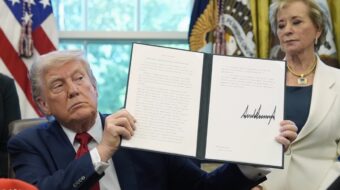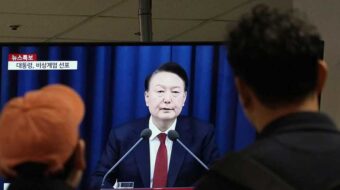Routine administrative and legal procedures are often subject to manipulation, never more so than when Cuba’s enemies manipulate them.
The misuse of accepted procedures is seen in the continuing persecution of five Cuban men and members of their families. René Gonzáles, Gerardo Hernández, Ramon Labañino, Antonio Guerrero and Fernando González have been in U.S. jails for seven years. Three of them received life terms (two life terms for one), the other two, 19 years and 15 years each. Their crime: giving Cuba a heads-up on anti-Cuba terrorist actions coming out of Florida.
Olga Salanueva has not visited her husband René for over five years. René last saw their 7-year-old daughter Ivette when she was four months old. Adriana Perez has not has not seen her husband Gerardo for seven years.
The U.S. government refuses to issue them visas that are required for entry into the United States. Amnesty International in 2002 and the UN Human Rights Commission this year condemned the U.S. denial of visas as a violation of international law.
On Oct. 29, Adriana learned that Washington had rejected her sixth visa application. After multiple interviews, administration officials informed Olga on Nov. 9 that a decision on her seventh application was “delayed.”
U.S. officials base their refusal to grant Olga a visa on regulations relating to her deportation in 2002. Their first excuse with Adriana was that she represented a security threat. Now she is excluded as a potential immigrant. Observers suggest that Washington holds back on visas in order to intimidate René and Gerardo.
Judicial proceedings for the five prisoners are off course too. On Aug. 9, the 11th Circuit Court of Appeals ruled that the verdicts handed down at their Miami trial were prejudiced and invalid. A new trial was expected.
On Oct. 31, however, the court announced its acceptance of the prosecution’s request for another appeals hearing, this time before the whole court rather than a three-judge panel. The new appeal will extend well into 2006.
Richard Klugh, defense lawyer for Fernando González, was incredulous. In 25 years, he told the Cuban newspaper Juventud Rebelde, he had never encountered a “full court hearing granted for reconsideration of a unanimous decision” from a judicial panel. “We are speaking of ideas, of an ideological battle. … In the United States what we have is the politicization of criminal law.”
The case of Luis Posada Carilles, an international terrorist in U.S. custody, also illustrates the hazards of subordinating the law to political considerations. Venezuela has requested Posada’s extradition so that judicial proceedings interrupted by his CIA-assisted escape from jail can be resumed. He was in prison there for having organized the bombing in 1976 of a Cuban airliner that killed 73 persons.
An extradition treaty exists between the two nations. Nevertheless, a U.S. immigration judge on Sept. 26 ruled against extradition. He’d heard uncorroborated testimony from a former Posada accomplice that current-day Venezuela tortures prisoners. He went on to invoke the UN Convention on Torture. Posada, an admitted terrorist, may eventually go free on parole unless Washington soon finds another country to accept him.
atwhit at megalink.net









